Bleak outlook:
Charmaine Kok* (34) lifts herself out of a rusted metal chair in her houthok‘s (wooden shack) kitchen and trudges to her son, Smallie. He’s turning 11 in August and is sitting at a small table in front of an old desktop computer.
Kok is preparing to begin her child’s favourite computer game, involving cars.
Smallie owes his name to his appearance: he’s smaller and shorter than his peers and looks about eight years old. He’s Kok’s third child. The family’s shack is in the backyard of a ground-level municipal flat in Roodewal, a mainly coloured township in Worcester in the Western Cape.
Drinking while pregnant: The reality
[multimedia source=”http://bhekisisa.org/multimedia/2015-06-18-drinking-while-pregnant-the-reality”]
The young boy has small eyes that are set wide apart, and an underdeveloped groove between his nose and upper lip. He concentrates on the game for a few minutes, but then his attention is diverted.
” Dik stuk [fat thing]!” he calls his overweight mother with a wildly waving hand. “When am I going back to school?”
His mother laughs then sighs. “Nothing guards Smallie’s mouth. He always says exactly what he thinks.”
As the boy goes to the kitchen to find something to eat, Kok fiddles nervously with the red and yellow dress she’s wearing, and says: “At first I had no idea Smallie had a problem. But when he turned six and went to school, the teachers told me he wasn’t like the other children.”
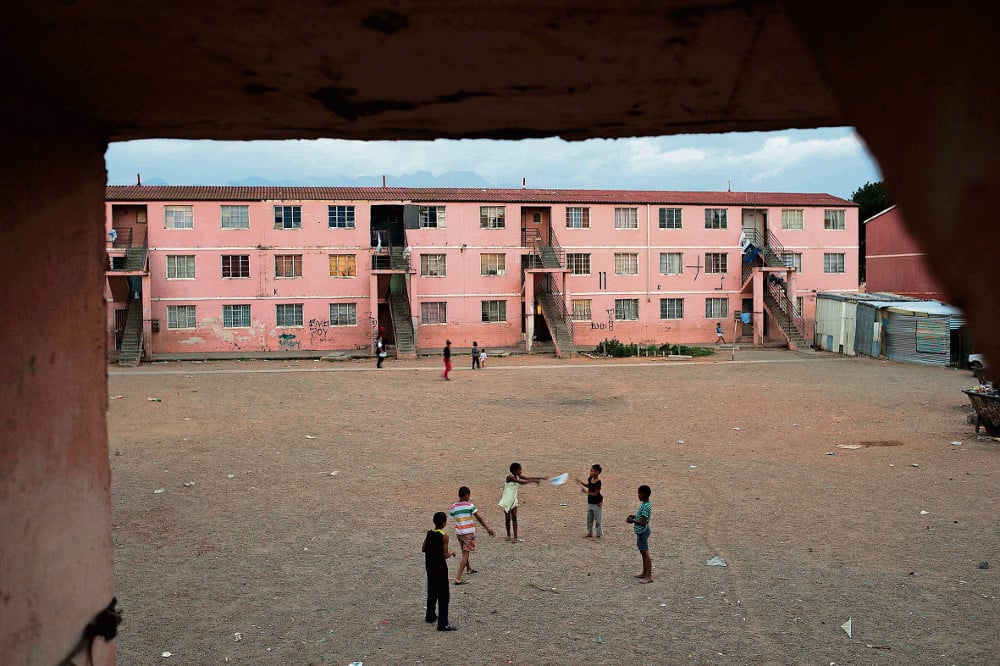 Children playing in Roodewal, a community plagued by poverty and alcohol abuse
Children playing in Roodewal, a community plagued by poverty and alcohol abuse
‘I stopped when it was too late’
When Kok was pregnant with Smallie, she was a heavy drinker. “The day when my labour pains started, I had just woken up from a tiep [hangover],” she recalls. “I was babbalas [hungover] when I got to the hospital and I gave birth to him in that condition.”
Kok and her friends would binge drink almost every day: about 15 quarts of beers and two to three krane (2-litre wine boxes) among four or five of them a day, mostly in the afternoons.
Alcohol was always part of Kok’s life. She grew up with it and says she was 13 when she started drinking regularly. Her mother was a heavy drinker too, just like her mother’s brother, where Kok and her siblings lived.
She was 17 when she fell pregnant with her first child.
“I drank throughout the pregnancies of all four my children, but with Smallie I drank more than with the others,” Kok says. “All of my kids have got some kind of small problem, but Smallie is the one with big problems.”
When Smallie started school, he rarely stayed in the classroom. While teachers were teaching, he would run outside to climb trees or play on the school’s rooftop.
Sometimes he would remove his clothes and do bollemakiesies (rollovers), naked.
“His behaviour was inappropriate and teachers got nervous and impatient with him. And, on top of everything else, he would also swear and show the teachers his middle finger,” says Kok.
Smallie failed grade 1. After that year, the teachers called Kok in for a meeting in which they demanded that she take her son to the local hospital “for testing”.
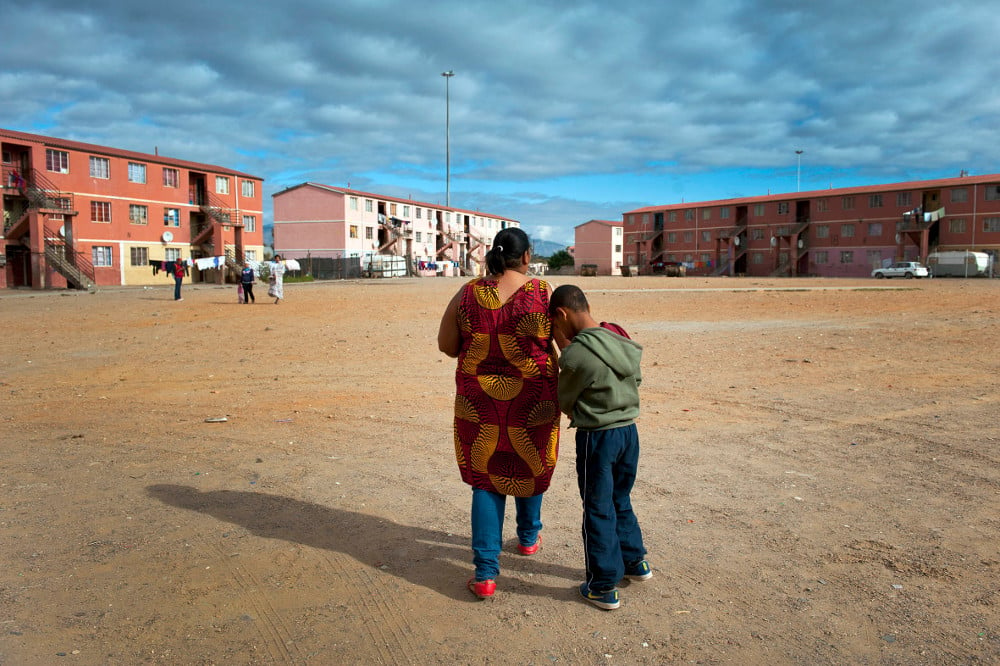 Kok* and her son Smallie, who has fetal alcohol syndrome
Kok* and her son Smallie, who has fetal alcohol syndrome
About two years ago, after several hospital visits, doctors and therapists at Worcester Hospital diagnosed Smallie with fetal alcohol syndrome, the worst form of a range of permanent disorders that children born to mothers who drink during pregnancy frequently suffer from.
Studies have shown that children like Smallie have low IQs of between 60 and 70, as opposed to the average 100, are born underweight and stay small and short throughout their lives because of growth retardation.
They often have distinct facial features such as wide-set eyes and a smooth skin surface between the nose and upper lip, instead of a groove.
But more than that, such children “frequently lack the ability to regulate their emotional responses and, for example, may speak or act before considering the social acceptability of their actions”, according to a 2013 study in the Journal of Developmental and Behavioural Paediatrics.
Kok stopped drinking when Smallie was six. “But it was too late,” she mumbles. “They’ve explained to me that Smallie’s IQ is low and he can’t concentrate well because of what the alcohol did to his brain. They say he has very bad attention deficit and hyperactivity disorder (ADHD).”
Smallie has been put on ADHD medication and is now in grade 4 – in an ordinary school because there’s no place for him in a government special needs school.
“The Ritalin has made him much calmer, but I think the school just put him through automatically, he didn’t really pass,” Kok says. “Each grade’s teachers just want to get rid of him.”
In May the local clinic ran out of Ritalin. Kok explains: “So the school sent Smallie home for a week until the medication became available again. I guess I can’t expect other people to understand my son the way I got to understand him at the hospital’s support group.”
Kok and six other women now go from door to door in Roodewal to educate women about the dangers of drinking while pregnant.
“I feel very guilty about my son’s condition. He’s paying the price for what I did,” she says.
Kok starts to fondle her dress again. “But God has shown me that he’s forgiven me. I can still do something for others. I can take them by the hand and tell them: ‘don’t do this, there will be consequences’. It’s not too late for them.”
‘I’ve never used contraception’
Bianca Williams* (22) is beaming. It’s September 2014 and she’s close to nine months pregnant. “It’s a boy,” she smiles. “But I don’t have a name yet. I just call him ‘Baba’.”
It took a while to get this enthusiastic about her baby; Bianca’s pregnancy came as a huge shock. “I’ve been sexually active for a few years, but I’ve never used contraception – only condoms sometimes. I don’t really know why,” she says.
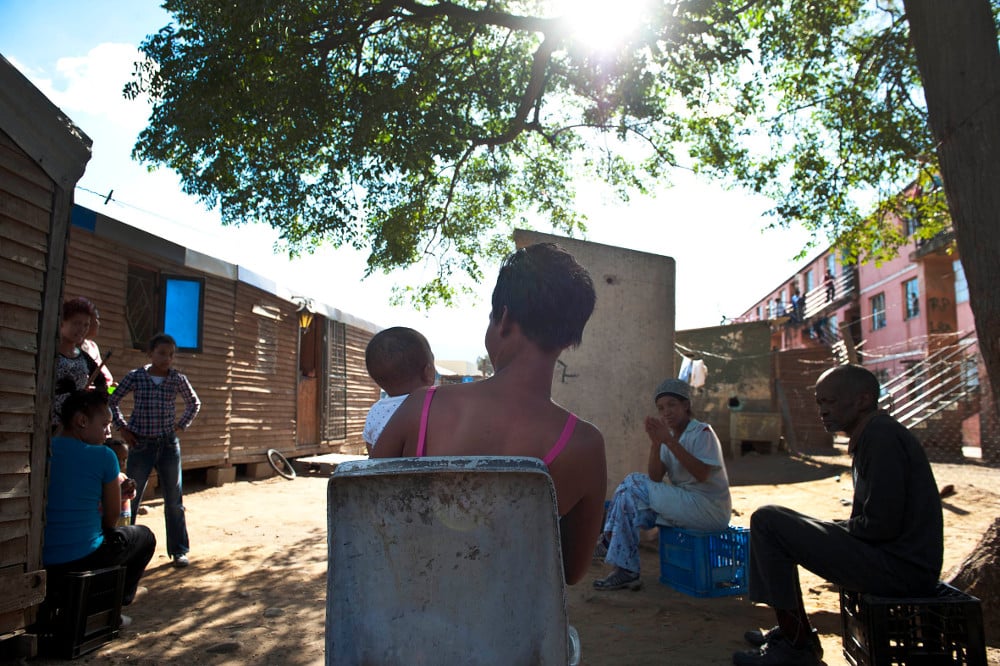 Bianca Williams* was interviewed while still pregnant with her now nine-month-old son
Bianca Williams* was interviewed while still pregnant with her now nine-month-old son
Williams only found out she was pregnant in the third month of her pregnancy. She and her boyfriend – who already has an 11-year-old son and twin sons (5) – had been together for just over a year. They were both heavy drinkers and live in Roodewal.
Several studies show the psychoactive effect of alcohol reduces effective contraceptive use, as it impairs judgment. According to a 2008 report coauthored by the Universities of Cape Town and Pretoria and the Medical Research Council, alcohol consumption and sexually risky behaviour feed off each other.
“It is therefore those women who are less likely to plan their pregnancies who are more likely to use alcohol to the extent that they will find it difficult to give up drinking during pregnancy and are more likely to confirm their pregnancy late, having caused harm to the fetus unknowingly,” the report states.
Williams continued to drink after she found out about her pregnancy – “in the same way that I had done all those years before”.
But when she was four months pregnant, a woman known as Sis Babs knocked on Williams’ door. Sis Babs was a community worker, or mentor, for a local organisation, FASfacts, that works to prevent babies from being born with fetal alcohol spectrum disorders.
“I learned my baby’s brain was still developing and that the alcohol that I drank could damage his brain,” Williams says. “I thought to myself, ‘how would I have felt if my mother had drank like this with me?’ “
But even with this knowledge, the young woman didn’t manage to stop drinking immediately.
“It was so difficult to leave the alcohol,” she says. “I started to drink less, but only succeeded in stopping completely when I was six months pregnant.”
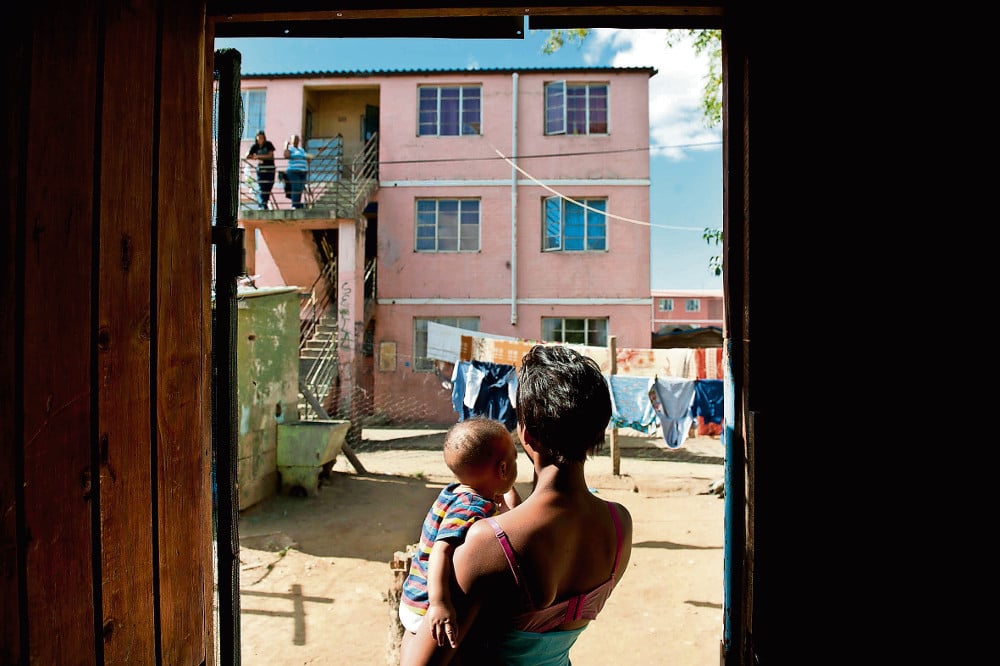 Williams* drank until she was six months pregnant
Williams* drank until she was six months pregnant
According to Michelle Liebenberg, the FASfacts social worker at the time, “you can’t expect a heavy-drinking woman, who is in many ways addicted to alcohol, and who also experiences peer pressure to drink, to stop drinking instantly just because you give her basic knowledge about the dangers for her baby. Such women need support networks and someone that they can walk to or phone when they get tempted to drink. That’s why our mentors are from the community which they serve.”
Sis Babs visited Williams at least once a week and also paid her unexpected visits over the weekend until the end of her pregnancy. She continues to do so while the young mother is breastfeeding; when a woman who breastfeeds drinks alcohol, some of the alcohol is passed on to her baby through the breast milk.
Last year, FASfacts’s mentors in Roodewal worked with 79 pregnant women. As a result, 77% of them stopped drinking while pregnant and breastfeeding.
Williams places her hands over her abdomen on the black and silver top she’s wearing. “I just hope and pray my baby is going to be normal,” she whispers. “I want him to be able to do what other children can do.”
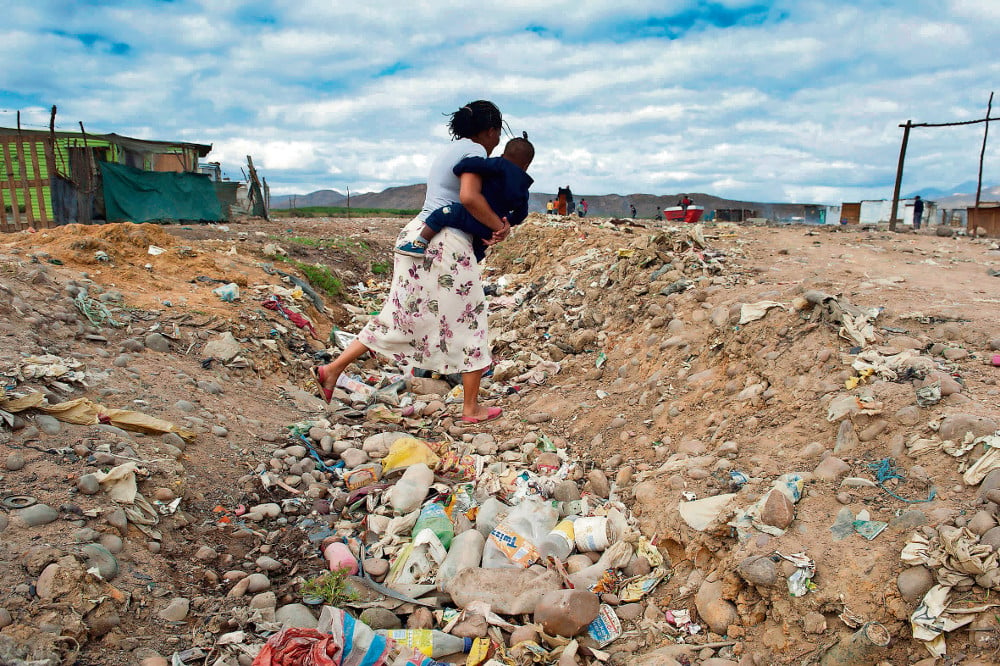 Hopeful: Lee-Anne Jacobs* stopped drinking three months into her pregnancy
Hopeful: Lee-Anne Jacobs* stopped drinking three months into her pregnancy
‘There was no money for food’
“On Fridays, particularly, I always had a lus [desire] for a dop [alcoholic drink]. But I would drink the most on the All Pay days [social grant pay-out days],” explains Lee-Anne Jacobs* from a dilapidated fauxsuede couch in her tin shack. She is feeding porridge to her 10-month-old daughter.
Jacobs lives in Roodewal’s squatter camp and has five children. The shacks are built almost on top of each other.
“On All Pay days I would buy bread for my children from their grants, but then use the money I’m supposed to buy sugar and milk with for wine. Actually, I would buy wine from all the rest of the money, and when that money’s finished, I’d start to buy sign wyn [wine on account], which you can pay at the end of the month,” she says.
Jacobs pats her baby on her back. The child has fallen asleep.
“The consequence of sign wyn is that there’s never money for food. That shop auntie sees your boek [account] is high, but she keeps on giving you wine. When the end of the month comes, almost all your money goes into paying off your sign wyn.”
Opposite the couch where Jacobs sits, a piece of material with a rose print is stretched over the wall. There are pictures stuck on to it of Jesus, ones of Jacobs in a wedding gown and others of her children.
“Wine and beer are available here in Roodewal 24/7. You can knock on the door of most shebeens here in the middle of the night, and they’ll give you what you want,” Jacobs says.
She’s talking about some of the Western Cape’s estimated 25 000 unlicensed shebeens, which, according to the Western Cape government’s department for economic development, must be legalised or shut down.
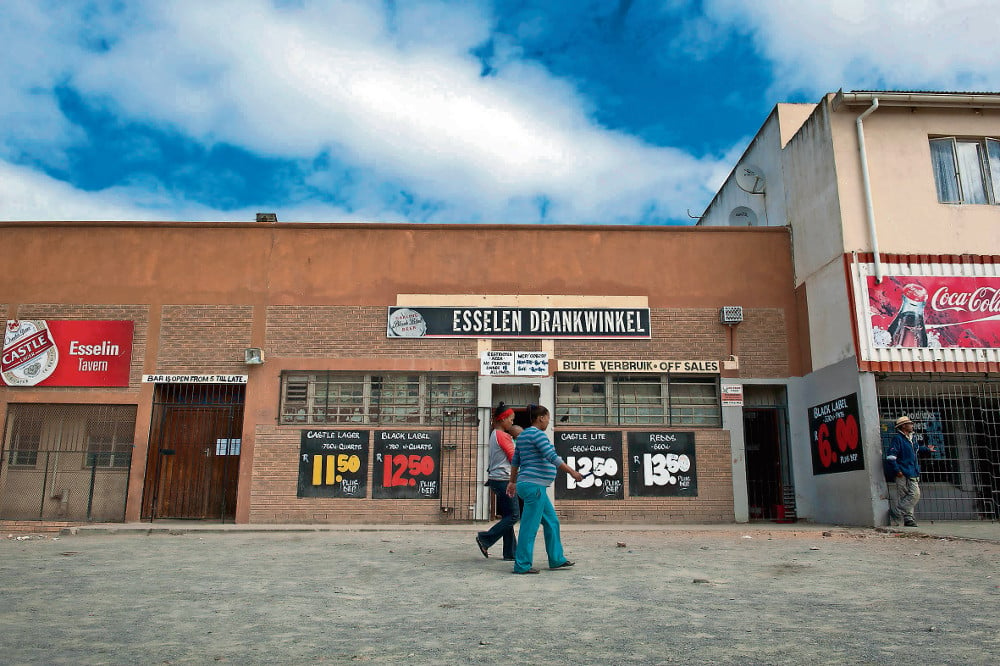 Drink on tap: In towns where poverty abounds and many legal bottle stores and unlicensed shebeens are willing to give credit, NGO FASfacts has its work cut out in educating women not to drink while pregnant
Drink on tap: In towns where poverty abounds and many legal bottle stores and unlicensed shebeens are willing to give credit, NGO FASfacts has its work cut out in educating women not to drink while pregnant
“It’s not that the drankwinkels [legal liquor stores] don’t play a role in making alcohol available too, but they at least have operating hours they have to follow,” Jacobs explains. “Many of the illegal ones are open right through the night.”
Jacobs stopped drinking alcohol after the third month of her pregnancy after a FASfacts mentor started visiting her before that.
By stopping, she reduced her baby’s chances of being born with a fetal alcohol spectrum disorder fivefold.
According to a 2013 study in the Journal of Drug and Alcohol Dependence, which was conducted among Western Cape women, mothers who drank during the first trimester of their pregnancies increased their chances of giving birth to a child with fetal alcohol spectrum disorder by 12 times.
If the mothers continued to drink right through their pregnancies, they boosted the likelihood to 65 times. But if a woman stopped drinking after the first trimester, she decreased the odds of having a baby with fetal alcohol spectrum disorder by five times.
It wasn’t only her unborn baby who benefited from Jacobs’s decision to stop drinking alcohol. “I can now cook healthy meals for my kids with the money that I previously bought wine with,” she explains.
Jacobs gets up to look at one of the pictures of her children on the rose-print material.
“My kids were so incredibly scared of me when I drank so much,” she says. “My two eldest girls [16 and 14 years old] live with their father. When they visited me over weekends, they would ask their aunt, who lives down the road, if they could sleep there. ‘Mammie, you’re just drunk all the time,’ they would say. ‘It’s not lekker [nice] at your house and there’s never anything to eat’.”
Jacobs pauses and a smile crosses her face. “But now my two girls can’t wait to visit me. One told me the other day: ‘Mammie, I now sommer [just] start to cry when the school holidays aren’t coming quickly enough for me to come and visit you for a few weeks.’ “
* The women interviewed were willing to be identified, but Bhekisisa chose to protect them from potential discrimination
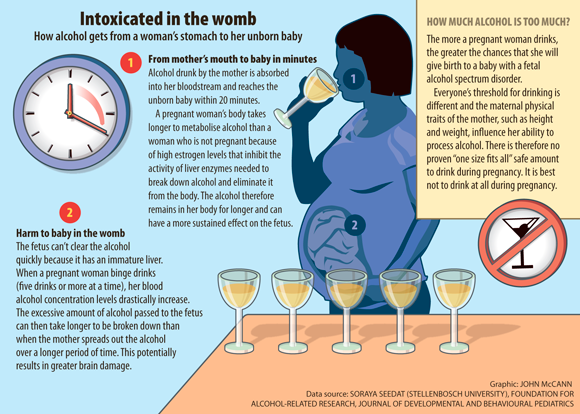
How booze binges can lead to sexually transmitted infections
Alcohol, the most widespread drug of abuse in South Africa, is the third-largest contributor to death and disability after unsafe sex, sexually transmitted infections and interpersonal violence in the country, according to a 2014 study published in the South African Medical Journal. Alcohol-related deaths comprise 6.1% of all deaths in the country; it has been estimated that 6.2% of disability can be attributed to alcohol.
Both unsafe sex and interpersonal violence are influenced by alcohol consumption. Studies have linked binge drinking (five drinks or more at a time) in particular with these behaviours. The World Health Organisation reports that one in three South Africans who drink alcohol binge drink – the global average is 11.5%.
According to the United States government’s National Institute on Alcohol Abuse and Alcoholism, alcohol use is among the “most reliable predictors of sexual risk behaviour” in populations at high risk of contracting HIV.
Why?
“Alcohol elevates sexual risks through multiple channels, including the psychological effects of intoxication on decision-making, inhibition of protective actions, interactions between drinking and risk-taking personality characteristics, and perceived expectations regarding the effective of alcohol use on risk-taking and sexual experiences,” a 2005 study in the journal Sexually Transmitted Diseases states.
Research conducted in South African townships in 2008, and published in Prevention Science, concluded that one in four drinkers reported having met sex partners at their local shebeen. Those participants who met their sex partners at drinking venues had more sex partners and higher rates of unprotected sex than those who did not meet their partners in taverns.
Another study, published in the journal Aids in 2003, reports that more than 85% of the places where South Africans meet sex partners are alcohol-serving venues.
This year, researchers of Harvard University’s department of development studies conducted a study in rural Mpumalanga and published their results in Sexually Transmitted Diseases. They concluded that the more alcohol outlets there were in a community, the more likely young women were to have herpes, a sexually transmitted infection transmitted in a similar way to HIV. For every additional alcohol outlet, the study found herpes prevalence in young women increased by 10%. – Mia Malan
[Note this article was originally published on 18 June 2015]
